social bookmarking tools:
 |
|
| Available RSS Feeds |
|---|
 - Top Picks - Top Picks |
 - Today's Music - Today's Music |
 - Editor's Blog - Editor's Blog
|
 - Articles - Articles
|
Add Louisville Music News' RSS Feed to Your Yahoo!
|
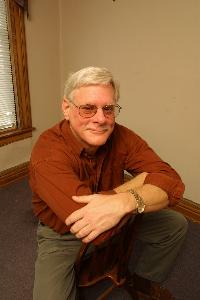 |
| Photo by James Moses |
| Roger Dane. |
Roger Dane - Orchestra Leader
Big band with a big sound -- in a small room
It was 1966 when trumpeter Thad Jones and drummer Mel Lewis, looking for an outlet for their original big band compositions, decided to put together a semi-regular gig on off-nights.
Truly, the life of a freelance jazz musician leaves precious few of those. So it was that Jones and Lewis, both of whom are now deceased, formed Monday Nights at the Village Vanguard. Over the next decade, even though it was always a part-time gig, this outlet made Jones and Lewis famous and opened new doors for jazz musicians like them.
So it is with Louisville's own Roger Dane Orchestra. Dane, 54, is a well-known Louisville freelancer who was similarly looking for an outlet for his own jazz creativity. Between his 27-year teaching career, gigs with the Louisville Orchestra and with various brass quintets, plus jobs at the Palace with stars like Steve Lawrence and the Manhattan Transfer, little time was left. There were no opportunities either - until Dane created one himself.
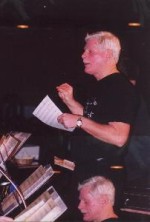 |
| Photo by Paul Moffett |
| Roger Dane goes over the charts before the concert. |
So, while it might not be the Village Vanguard, Dane has the Comedy Caravan. On the third Monday of every month, Dane and a group of friends get together as an 18-piece ensemble to play big band jazz in the tradition of Count Basie and Duke Ellington. Interestingly, not only is the gig an outlet for Dane's writing and musical urges, it's become a regularly attended gig of choice for many music fans as well. Indeed, in a city that is being touted as a hard rock scene, where bands like Tantric and Flaw are the headliners, the Roger Dane Orchestra has carved out a favored regular outing for jazz music as well.
"The band has had a steadily growing following," said Tom Sobel, who runs the Comedy Caravan. "For the shows in October and November, we had to turn people away."
What in the name of Buddy Rich is going on here?
Freelancing In The River City
"It's such an eclectic thing to do to be a freelance musician," Dane said.
Retired recently from Jefferson County Public Schools and having taken over for Mel Owens' WHAS orchestra in the early 1990s, Dane was looking for an outlet much like Monday Nights at the Village Vanguard.
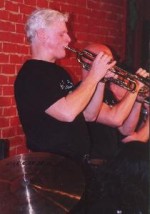 |
| Photo by Paul Moffett |
| Dane handles the trumpet parts. |
It was through regular appearances with the Louisville Jazz Society at the Comedy Caravan that the Roger Dane Orchestra came to find its regular gig two years ago this month. But it's because of constraints like those Jones and Lewis faced that Dane and his fellow band members sought such a gig in the first place.
And, much like Jones and Lewis' Monday night gigs, what began largely as a good time has become a high-profile event.
It began as part of a series of concerts sponsored by the Louisville Jazz Society, and grew into the current regular gig by the Roger Dane Orchestra. As the orchestra's membership is made up largely of free-lance musicians, a natural ebb and flow occurs within the band. If someone has a gig on the same night as a Comedy Caravan show, a replacement player is brought in. In addition, players often switch seats to accommodate replacement players.
"The band is very versatile," Dane, a New Jersey native who holds a Master's degree in music from the University of Louisville, said. "We have saxophone players that play flutes and clarinets, which is required on lot of those Broadway musicals and that kind of stuff. Everybody is a key player."
One of the regulars is Dave Clark on lead alto sax. Clark has been a regular at Bobby J's on Bardstown Road for several years. There's also Todd Hildreth, the de facto leader of local favorites the Java Men, on piano. Vocalist Gayle King, well-known in local dinner theater and for her solo act at the Holiday Inn downtown, is also a regular. Jon Topy, first trombone, does a lot of Broadway Series shows at the Palace and also works at Falk Studios here in Louisville.
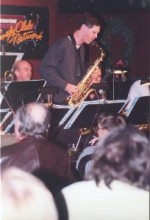 |
| Photo by Paul Moffett |
| Tom Walsh drove down from Bloomington for the concert. |
Miles Davis (no, not that Miles Davis), who owns and operates Miles Ahead Instrument Sales and Service, joined the orchestra on saxophone almost from the beginning.
"Roger was my band director in high school, so I've been playing with him for over 20 years," Davis said. "
Dave Wiest, second alto sax player, does a lot of musical theater locally and is the main woodwind artist at Derby Dinner Playhouse in Southern Indiana. Wiest studied at University of Louisville under Michael Tracy, who has performed around the world with the likes of Ella Fitzgerald, Buddy Rich and Pat La Barbera. Weist began as a sub in Dane's orchestra and became a regular when the Comedy Caravan gigs began.
"Everybody (in the orchestra) is in lots of bands," Dane said. "You can't have 18 pieces and not have substitutes at times. I've been amazed at how little it happens, really. You're talking about guys who are free-lance musicians. They will take shows like `Fiddler on the Roof' or in churches or dance jobs or wedding jobs. We also run into each other in different venues like that. It could be a Superpops concert or anything."
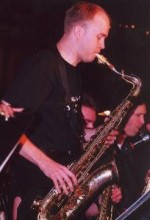 |
| Photo by Paul Moffett |
| Aaron Inman takes a solo. |
All these musicians and others find their way into Comedy Caravan on as many of those Mondays as possible - even though it isn't what most would consider a plum gig, from a financial standpoint. It's mostly about the experience and the camaraderie.
"This is more a labor of love," Dane said. "We just play for the door."
That labor of love can also be made a little more loveable when a notable guest artist sits in - and that has been known to happen.
One recent show featured one of Dane's students, and it's not uncommon to have jazz students from U of L sit in. But it's also fairly common to see well-known jazz musicians stop in and play a couple of sets with the orchestra.
For instance the Bizannes brothers have appeared, as have folk heroes Robin and Linda Williams, Ron Jones and influential folk songwriter and guitarist Ramblin' Jack Elliott. There's talk that Tommy Newsom (a mainstay in Doc Severinson's band on "The Tonight Show") might make an appearance. All of this testifies to the respect Dane has in the jazz community, especially here in Louisville.
"Let's put it this way," said Sobel. "The greatest compliment Roger could have is that he had Vince DeMartino (a well-known trombone player) come over twice to play with the band. The first time it was at Roger's urging, and the second time it was (DeMartino's) request to return."
Big Fun In A Small Room
Aside from the diverse talent that comes back on the third Monday of every month, there is an ever-growing group of jazz and big band lovers that is making the Roger Dane Orchestra show a regular addition to its music appreciation schedule.
When the concerts began, it was mostly fellow musicians who showed up. As word has slowly gotten around, more and more people have found their way to the shows. Older fans that grew up on big band music have discovered it, as have budding jazz musicians of all ages. As Sobel noted, the last few concerts of 2001 were to full houses. No one in the orchestra is especially shocked.
"It's been good here of late," Dane understated. "We have a lot of people who come every month. My take on it is they enjoy the intimacy of the setting and the involvement of the players. When the artists get on stage and they're having fun, the audience picks up on that. There's a lot of people who just like that kind of music who never had an outlet to hear it."
"I'm not surprised," said Wiest. "In this town there are a lot of people that are into it. Word has just gotten out. Jazz music is an acquired taste anyway, so people who do come are usually pretty educated about the music. They know what they like and know what they like to hear."
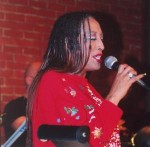 |
| Photo by Paul Moffett |
| Gayle King is the Orchestra's vocalist. |
"It's a lot of fun," Davis said. "This is not the type of music you play on your average dance job. It's kind of infectious. We're having fun, and the crowd is having fun. We're doing this stuff on a whim - we don't rehearse, so the audience is hearing a lot of it for the first time just like we are."
"It is fun," Wiest agreed. "All the people that are there, they love the music - they're hungry for it. There's a lot of people who are there every moth, plus people who are coming for the first time. To be able to hear a big band in a club setting like that, you'd normally have to go to New York. To have it here in Louisville is fun."
Naturally, the intimate nature of the Comedy Caravan - which, of course, is a longtime Louisville mainstay as a comedy club - plays a part as well. If you've been to the Caravan, you can imagine what it must be like to hear an 18-piece band in that room.
"Louisville has always had a lot of good places where you can go drink, socialize and hang, but we have not had many places where you could go to listen," Sobel said. "Louisville is discovering what it means to come to listen to music rather than to come to drink and listen to what we call `audio wallpaper.'"
It's a natural fit, he said, because "as a comedy club, that's what we do full-time -- we're a listening room."
The sound and the spectacle are definitely something to behold.
"For the audiences, to be able to sit 10 feet in front of a 14-piece horn section is kind of an up-close opportunity people rarely get," Sobel said. "And of course the beauty of the room is that there are not only no bad seats to see from but no bad seats to hear from. You can walk through the entire place and the sound is the same."
There are other venues for big band music in the area, but most of those are scaled-down dance bands aimed at a senior citizen crowd that wants to get up and boogie. Bob Holt and the Prime Time, the Mello Tones and the Wes Holt Combo play dances at churches and senior citizens centers, but that's a different kind of gig.
Dane is pleased by the fact that it has turned out that Louisville listeners can be just as enthusiastic as dancers, no matter what the age.
"It's been growing consistently," he said. "I'm really pleased with not only the quantity of the audience but the quality. They're very knowledgeable and they're a good listening audience. It's not a rowdy crowd. They come to listen. The club is not designed for dancing - and we've had people who've inquired about that."
It's Not The Swing Thing
Just what is big band music anyway? That's difficult to pinpoint, because it often depends on whom you're talking to. Different time periods have given birth to different forms of big band styles. The term "jazz" also is used rather loosely, adding another layer to the cake.
The All-Music Guide, a well-known music database on the Internet, not only breaks big band music down into eras but also defines it also as dependent somewhat on the makeup of the band itself. Here is AMG's big band story in a nutshell:
"Big Band refers to a jazz group of 10 or more musicians, usually featuring at least three trumpets, two or more trombones, four or more saxophones, and a `rhythm section' of accompanists playing some combination of piano, guitar, bass, and drums. `Big band music' as a concept for music fans is identified most with the swing era, although there were large, jazz-oriented dance bands before the swing era of the 1930s and '40s, and large jazz-oriented concert bands after the swing era.
"Classification difficulties occur when stores shelve recordings by all large jazz ensembles as though it were a single style, despite the shifting harmonic and rhythmic approaches employed by new ensembles of similar instrumentation that have formed since the swing era. By lumping the music of all large jazz bands together, marketers overlook the different kinds of jazz that large groups have performed: swing (Duke Ellington and Count Basie), bebop (Dizzy Gillespie), cool (Gerry Mulligan, Shorty Rogers, Gil Evans), hard bop (Gerald Wilson), free jazz (some of Sun Ra's work after the 1950s), and jazz-rock fusion (Don Ellis' and Maynard Ferguson's groups of the 1970s)."
It also bears noting that there is often a distinction drawn based on bands with harder rhythmic qualities and frequent solo improvisations and those that conveyed less pronounced swing feeling and improvisation. The former of those are often called "swing bands" or "hot bands," while the latter typically are called "sweet bands."
Confused? Perhaps it's better to hear it from the horse's mouth.
"We play traditional big band music, like the orchestras of Count Basie and Duke Ellington," Dane said. "Some of the more modern bands would be Buddy Rich and the Thad Jones and Mel Lewis Orchestra.
"This is not really the hyped-up kind of swing thing that Brian Setzer and Big Bad Voodoo Daddy are doing -- although we do some things that they would do, but we do things they would never do. We do a lot more variety than they do."
Not that the "swing thing" isn't a good thing. If it has introduced a new generation of music lovers to at least some form of big band music, then all the better for the Roger Dane Orchestra. One of the goals of the band and its once-a-month gigs is to attract younger audiences. It was, after all, while in high school that Dane began playing jazz with his father.
"We are trying to attract a younger audience, especially ones studying music in school," he said. "We have kids that are in middle school up to senior citizens that come."
Said Davis, "I think at the beginning it was mostly musicians and quite a few older people at the shows. Any more, there seems to be a really good mix. We're starting to see people come who are in their teens and early 20s. In this day and age, to be able to go hear live musicians on stage is not something you can do very often at age 18 to 20."
"That's kind of been one of our strategies to get some of the students in the area excited about it," Wiest said. "It's not a true night club in the sense you don't have to be 21 to get in there. It's an education for them to hear how loud it is and the way it's played. You can only get so much from recordings."
A young audience helps ensure a future, naturally, which is also something Dane wants for his orchestra. In addition to the big band classics, the group also incorporates a lot of modern arrangements written in the last 10 to 15 years. In much the same way that Mel Lewis benefited from his Monday night big band shows - as an outlet for his arrangements - the Monday Comedy Caravan shows have worked for Dane.
"We do a lot of original things," Dane said. "I'm an arranger, and I do one or two month."
Dane estimates that, in a two-hour show, about 20 percent of the music is original. With new arrangements piling up, the group is in the process of planning a CD, which likely will go into production in the spring. The main decision to make now is whether to record it live or in a studio setting.
"I have talked to an engineer about doing some live things and picking the best of them," Dane said. "I'm also considering doing it in the studio where you have more control. At this point, I'm leaning toward doing it in the studio."
In addition, beginning in 2002, Dane will bring a jazz quintet into Comedy Caravan on Mondays when the big band doesn't play. Hildreth, Dave Clark, Sonny Stevens and Darryl Cotton will join Dane in an ensemble that will play more traditional jazz and focus on originals, beginning Jan. 28.
"They're planning on blowing what I would call `jazz with an attitude' - the kind of jazz that in Louisville is generally presented as background music," Sobel said. "They're going to do in-your-face, you-came-here-to-listen-to-this kind of jazz."
And that certainly won't interfere with the orchestra's plans, Dane assured. "We've actually got a job booked in 2003 already."
In addition to that, the orchestra will soon be featured on a weekly basis on Louisville television station WYCS. The half-hour program, "Big Band Louisville" is tentatively scheduled to debut on Tuesday, January 29 at 8:30 p.m. The January, February and March performances at the Caravan will be videotaped and thirteen weekly programs will be edited from that material. The shows programmers hope that there will be enough advertising to continue the show beyond the initial thirteen-week run.
Meanwhile, you can check out the Roger Dane Orchestra on the third Monday of each month. Shows are 7:30-10 p.m., and admission is $6 for adults and $3 for students. Shows are non-smoking and open to all ages. The Comedy Caravan is located in Mid-City Mall, 1250 Bardstown Road.
